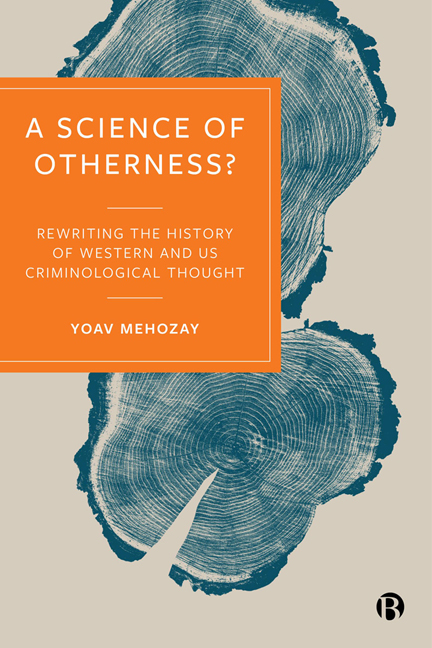Book contents
- Frontmatter
- Dedication
- Contents
- Acknowledgements
- 1 Introduction: Criminology as Otherness?
- 2 The Classical School: Otherness as an Ideology of an Imaginary Bourgeois Society
- 3 The Early Days of Positivist Criminology: An Ideology of Universalism and Otherness
- 4 Two Versions of Otherness: Between Eugenics and Modernization Theory
- 5 Otherness as Subculture
- 6 Managing the Other: Otherness in Practice
- 7 Conclusion: A Science of Otherness?
- Notes
- References
- Index
3 - The Early Days of Positivist Criminology: An Ideology of Universalism and Otherness
Published online by Cambridge University Press: 27 March 2024
- Frontmatter
- Dedication
- Contents
- Acknowledgements
- 1 Introduction: Criminology as Otherness?
- 2 The Classical School: Otherness as an Ideology of an Imaginary Bourgeois Society
- 3 The Early Days of Positivist Criminology: An Ideology of Universalism and Otherness
- 4 Two Versions of Otherness: Between Eugenics and Modernization Theory
- 5 Otherness as Subculture
- 6 Managing the Other: Otherness in Practice
- 7 Conclusion: A Science of Otherness?
- Notes
- References
- Index
Summary
The positivist school in criminology came to define the field for a century, or more. Indeed, even today, it is almost redundant to use the word ‘positivist’ before ‘criminology’; criminology means positivist criminology to most people. Historically, the advent of the positivist school marked a new paradigm for thinking and producing knowledge about delinquency, crime, and penology. It represented a new way of defining social problems and social solutions, motivated by a cluster of emerging social challenges for governmentality: namely, how to administer, control, and regulate populations as the appalling poverty begot by the Industrial Revolution – ‘the ugliest world in which man has ever lived’ (Hobsbawm, 1996: 298) – became incontrovertible.
The positivist school was part of a greater movement of already existing social activism and scholarly work that came to answer dual and competing objectives: to preserve and justify the social system that produced these horrific social conditions, and the positions of those who enjoyed its fruits, while at the same time maintaining an adherence to Enlightenment ideals such as equality and human dignity. The ‘solution’, if one can call it that, was found in degeneration theories: yes, all men are in theory created equal, but some are in fact created less equal than others, subject to some form of physical or social pathology which made them incapable of adopting a normative social life. The problem, in other words, lay not in the system, but in the individuals whose social degradation was seen as both symptom and signifier. This ‘solution’ can be defined as an ideology of otherness, combining universalism and exclusion. Otherness means that universal ideals do stand, but for some, their otherness excludes them from the rule. Given their pathology, these individuals cannot be party in the regular sense to the social contract, as held by the classical thinkers; instead, they need special treatment; and if they cannot be reformed, then they must somehow be excluded. This new understanding also marks the transition from sovereignty to discipline, in Foucault’s (2007) terms (briefly discussed at the end of the previous chapter).
In short, the positivist school rose to dominance as the leading paradigm for criminological knowledge production in the late nineteenth century, the ‘age of degeneration’ (Valverde, 2017a: 336), a doctrine shared by many of the social elites of the time.
- Type
- Chapter
- Information
- A Science of Otherness?Rereading the History of Western and US Criminological Thought, pp. 42 - 62Publisher: Bristol University PressPrint publication year: 2023



